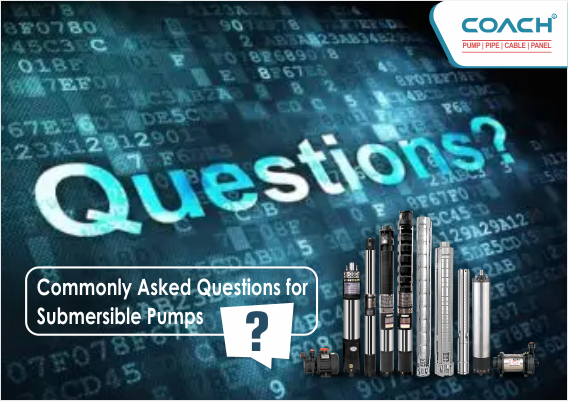Commonly Asked Questions for Submersible Pumps: Answers and Insights
- January 25, 2023
- Category :Submersible Pump & Motor

Introduction:
Submersible pumps are versatile devices used for various water pumping applications. As with any complex equipment, it’s natural to have questions regarding their operation, installation, maintenance, and more. In this blog post, we will address eight commonly asked questions about submersible pumps to provide answers and insights that will help you better understand these essential devices.
- How does a submersible pump work?
A submersible pump is designed to be submerged in water, allowing it to push water to the surface. The pump’s motor drives an impeller that creates a pressure difference, forcing water into the pump casing and through the discharge pipe. The pump is powered by electricity and is typically sealed to prevent water from entering the motor.
- What are the advantages of using a submersible pump?
Submersible pumps offer several advantages, including high efficiency, quiet operation, space-saving design, and the ability to handle a wide range of water depths. They are also less prone to cavitation and can be more energy-efficient compared to other types of pumps.
- Can submersible pumps handle solids and wastewater?
Yes, certain submersible pumps are designed to handle solids and wastewater. These pumps, known as sewage or effluent pumps, are equipped with robust impellers and can pass solids of varying sizes without clogging. They are commonly used in sewage systems, wastewater treatment plants, and other applications involving the pumping of effluent and wastewater.
- How deep can a submersible pump go?
The maximum depth a submersible pump can go depends on various factors, including the pump’s design, motor power, and the well’s water level. Deep well submersible pumps are specifically designed for greater depths, capable of extracting water from wells exceeding 100 feet or more.
- How do I select the right size submersible pump for my application?
To select the right size submersible pump, consider factors such as the required flow rate, total dynamic head (TDH), water depth, and the specific application’s needs. Consulting a pump professional or referring to manufacturer guidelines can help ensure you choose the appropriate pump size for optimal performance.
- What maintenance is required for submersible pumps?
Submersible pumps generally require minimal maintenance. Regular checks should include inspecting for debris or blockages, monitoring motor temperature and electrical connections, and ensuring proper lubrication. Following the manufacturer’s maintenance guidelines is crucial for the longevity and efficiency of the pump.
- Can submersible pumps be installed in existing wells?
Yes, submersible pumps can be installed in existing wells. However, it’s important to consider the well’s size, depth, and casing diameter to ensure compatibility with the chosen submersible pump. It is recommended to consult with a professional pump installer or plumber for proper installation.
- Are submersible pumps safe to use?
Submersible pumps are generally safe to use when installed and operated correctly. However, it’s essential to follow safety guidelines and ensure proper electrical connections, including the use of ground fault circuit interrupters (GFCIs) for electrical protection. Regular inspections, adherence to manufacturer instructions, and consulting professionals when needed contribute to safe pump operation.
Conclusion:
Submersible pumps are reliable and efficient devices used for various water pumping applications. Understanding the inner workings, advantages, installation process, maintenance requirements, and safety considerations is essential for their successful operation. By addressing these commonly asked questions, we hope to provide you with valuable insights and help you make informed decisions when it comes to utilizing submersible pumps for your specific needs. If you have further questions or require assistance, it is always recommended to consult pump professionals or experts for personalized guidance.
Final Thoughts
We hope these answers will help you make an informed purchase decision that would serve your purpose well for a minimum of 10 years.
Find more information on pumps at Coach Pumps, for further inquiry click here.






